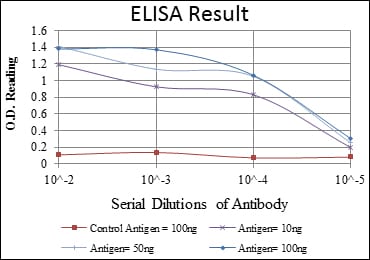

| WB | 咨询技术 | Human,Mouse,Rat |
| IF | 咨询技术 | Human,Mouse,Rat |
| IHC | 咨询技术 | Human,Mouse,Rat |
| ICC | 技术咨询 | Human,Mouse,Rat |
| FCM | 1/200 - 1/400 | Human,Mouse,Rat |
| Elisa | 1/10000 | Human,Mouse,Rat |
| Aliases | GELB; CLG4B; MMP-9; MANDP2 |
| Entrez GeneID | 4318 |
| clone | 5C3 |
| WB Predicted band size | 92kDa |
| Host/Isotype | Mouse IgG2a |
| Antibody Type | Primary antibody |
| Storage | Store at 4°C short term. Aliquot and store at -20°C long term. Avoid freeze/thaw cycles. |
| Species Reactivity | Human |
| Immunogen | Purified recombinant fragment of human MMP9 expressed in E. Coli. |
| Formulation | Purified antibody in PBS with 0.05% sodium azide. |
+ +
以下是关于MMP9抗体的3篇参考文献的简化信息:
1. **"Matrix metalloproteinase-9 (MMP-9) as a cancer biomarker and therapeutic target"**
- **作者**: Overall CM, López-Otín C
- **摘要**: 该综述探讨了MMP9在肿瘤侵袭和转移中的作用,总结了其抗体在抑制肿瘤微环境重塑中的潜在治疗价值,并讨论了基于抗体的靶向策略的临床进展。
2. **"A functional monoclonal antibody targeting the MMP-9 hemopexin domain inhibits cancer cell migration"**
- **作者**: Dufour A, Zucker S
- **摘要**: 研究团队开发了一种靶向MMP9血凝酶结构域的单克隆抗体,实验显示其能特异性阻断MMP9的酶活性,显著抑制癌细胞迁移和体内转移,为抗肿瘤治疗提供新工具。
3. **"MMP-9 in inflammation: a potential therapeutic target via antibody-mediated neutralization"**
- **作者**: Van den Steen PE, Opdenakker G
- **摘要**: 该文献分析了MMP9在炎症性疾病(如类风湿性关节炎)中的关键作用,验证了中和抗体通过抑制MMP9介导的炎症反应减轻组织损伤的效果,提示其临床应用前景。
4. **"Development of a high-affinity MMP-9 antibody for molecular imaging of atherosclerotic plaques"**
- **作者**: Newby AC, Johnson JL
- **摘要**: 研究报道了一种高亲和力MMP9抗体的开发,通过分子成像技术成功检测动脉粥样硬化斑块中MMP9的活性,为心血管疾病的早期诊断提供新方法。
**Background of MMP9 Antibody**
Matrix Metalloproteinase 9 (MMP9), a member of the zinc-dependent endopeptidase family, plays a critical role in degrading extracellular matrix (ECM) components, facilitating tissue remodeling, wound healing, and inflammatory responses. Overexpression of MMP9 is implicated in pathological conditions such as cancer metastasis, chronic inflammation, and cardiovascular diseases. MMP9 antibodies are essential tools for detecting and quantifying MMP9 expression, localization, and activity in both research and clinical settings.
These antibodies are designed to target specific epitopes on MMP9. enabling applications like Western blotting, immunohistochemistry (IHC), ELISA, and functional assays to inhibit enzymatic activity. MMP9’s structure includes a pro-domain, catalytic domain, and hemopexin-like domain, which influence antibody specificity. Monoclonal antibodies offer high specificity for consistent results, while polyclonal antibodies may detect multiple epitopes, enhancing sensitivity in diverse experimental setups.
In research, MMP9 antibodies aid in studying tumor microenvironments, angiogenesis, and inflammatory pathways. Clinically, they serve as biomarkers for disease progression (e.g., cancer prognosis) and therapeutic monitoring. Additionally, therapeutic MMP9 inhibitors, including neutralizing antibodies, are explored for targeting MMP9-driven pathologies. However, challenges remain in ensuring antibody specificity due to structural similarities among MMP family members. Overall, MMP9 antibodies are pivotal in advancing mechanistic insights and translational applications in ECM-related diseases.
×